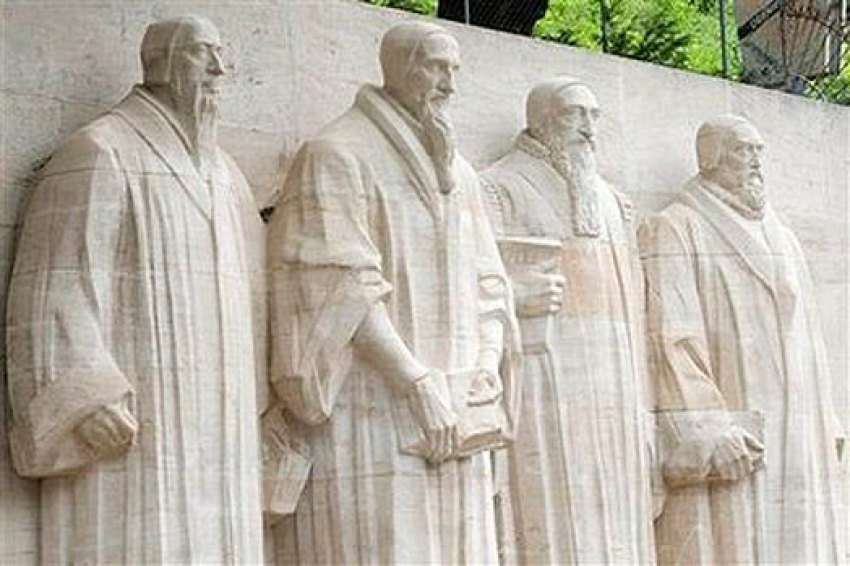The great debate: Predestination versus election

With this essay, we step into the most enduring debate in Christian theology. It’s all about a single word: election.
The term means to choose, as in electing a candidate. You “elected” to read this article. In theological use, the word relates to the idea that God chooses (or has chosen) a people or individuals to belong to him in a unique way.
There is no question that God “elected” Abraham and the nation he would establish so that “all peoples on earth will be blessed through you” (Genesis 12:3). Through that nation, he “elected” to bring the Messiah (cf. Isaiah 9:6-7).
Here’s the question: Does God “elect” those who are lost and those who are saved? Does he choose those who will be in heaven and those who will spend eternity in hell?
Tulips and their admirers
The name most often associated with the doctrine of election is John Calvin (1509-64), a law student who broke with Roman Catholicism and became a Protestant leader in Basel and Geneva.
His Institutes of the Christian Religion are still foundational to the movement known as Reform theology, promoted especially in America by Presbyterian churches.
His “five points,” as later expounded by the Synod of Dort (1618-19), summarize his theological system:
- Total depravity: the fall affected every part of mankind, mind as well as will.
- Unconditional divine election: we do nothing to earn salvation.
- Limited atonement: Christ died only for those elected by God for salvation.
- Irresistible grace: the elect will accept the grace of God.
- Perseverance of the saints: those elected by God will not lose their salvation.
A “five-point” or “tulip” Calvinist accepts all of these assertions.
Some theologians accept four or less. (I am myself a three-point Calvinist, as I’ll explain in a moment.)
Supporters of all five points argue that God’s will cannot be defeated if he is God—if he wants one of his creation to be in heaven, that person will be in heaven. They add that, if God is sovereign over the future, he must know what choice we are going to make regarding Christ.
When opponents protest that it’s not fair of God to choose some for heaven and others for hell, they reply (correctly) that if God were fair, none would be in heaven, for all salvation is by grace.
To which the opponent answers that, while none deserve heaven, it is unfair for any to be chosen for heaven unless all are chosen.
And the debate continues.
An election requires two candidates
If five-point Calvinism is one side of the issue of election, Arminianism is the other.
Joseph Arminius (1560-1609) believed that God gives his children the freedom to choose for him. Once we do, we retain that freedom and can later (tragically) choose against him.
This approach accepts “unconditional divine election” but not much else in the Tulip. John Wesley and his followers were greatly influenced by Arminius’s position and helped popularize it through the Methodist movement.
A third position is located somewhere between the first two.
It accepts Calvin’s belief in total depravity, so that salvation must be God’s gift; unconditional divine election, so that all is grace; and perseverance of the saints, arguing that, once we become the children of God, it is impossible for us to go back to our status before our conversion (cf. 2 Corinthians 5:17).
But this position also claims that God wants each human being to be in heaven with him:
- “He is patient with you, not wanting anyone to perish, but everyone to come to repentance” (2 Peter 3:9).
- “For God so loved the world that he gave his one and only Son . . .” (John 3:16a, emphasis mine).
- And it argues that we are each given the same freedom to choose salvation: “that whoever believes in him shall not perish but have eternal life” (v. 16b, emphasis mine).
Such a position could be called three-point Calvinism. This is my position, one the majority of evangelicals probably hold.
Those who argue for human freedom must face the question: How can I be free if God knows what I am going to choose?
God created time and so transcends it. God is not looking into tomorrow—he is already there today. It’s not so much that God “knows” the future as that for him there is no “future.” He is the eternal Now, the great I Am (Exodus 3:14).
But the fact that he happens to know what I am going to do tomorrow does not mean that he makes this choice for me.
The next time my family goes to an ice cream parlor, I guarantee that my wife will get Rocky Road, Craig will get chocolate, and I’ll get strawberry.
I have no idea what Ryan will choose.
Why?
Because every time since I’ve known them, that’s what they’ve done. The fact that I know their choice doesn’t mean I made it for them. While the analogy fails in that God knows absolutely what I only know predictively, its point is still valid.
Consider this fact: God knows exactly what you are doing in this moment, as you read these words. But the fact that he knows your thoughts, motives, and actions does not cause you to feel any less free in choosing them.
The fact that he knows your actions tomorrow makes them no less free when you choose them.
Conclusion
The issues and biblical texts involved in election and predestination are difficult and conflictual. Here we must especially seek unity in diversity and charity in all things.
As a practical consequence, whether you believe my faith was my choice or not, I hope you’ll agree that I am a Christian. Wherever we disagree on motives and choices, we agree that Jesus is Lord.
C. S. Lewis was right: if time is a line on a page, God is the page.
So long as we’re on the page with him, all is well.
Originally posted at Denison Forum.



























